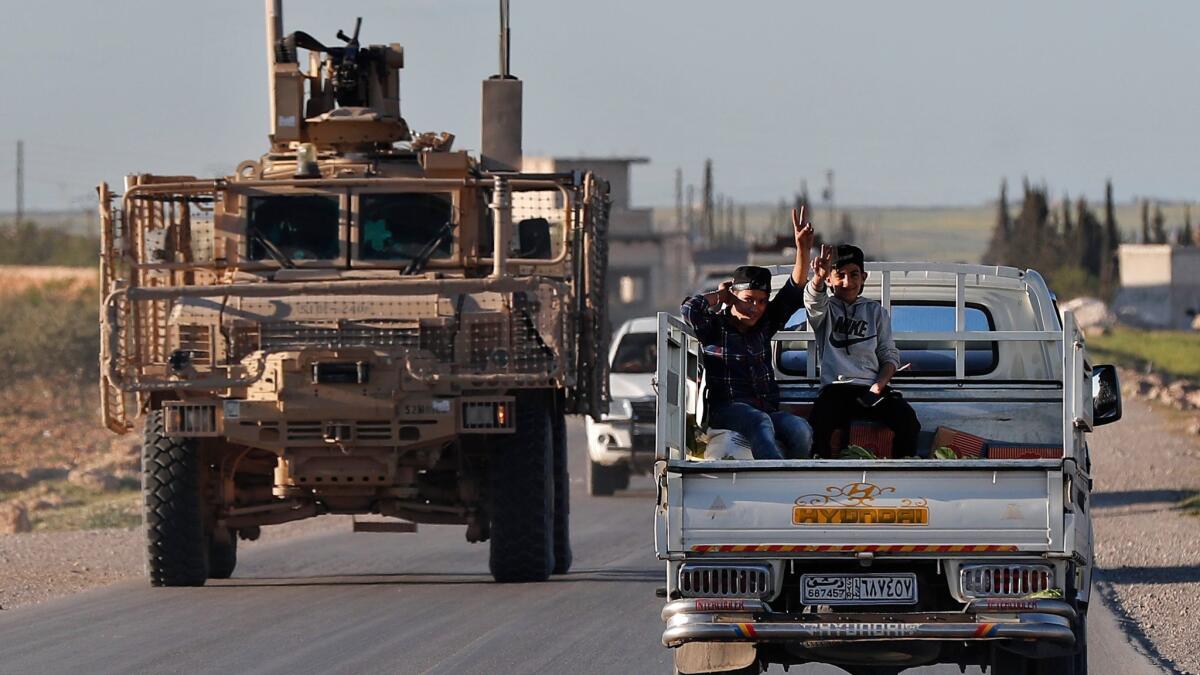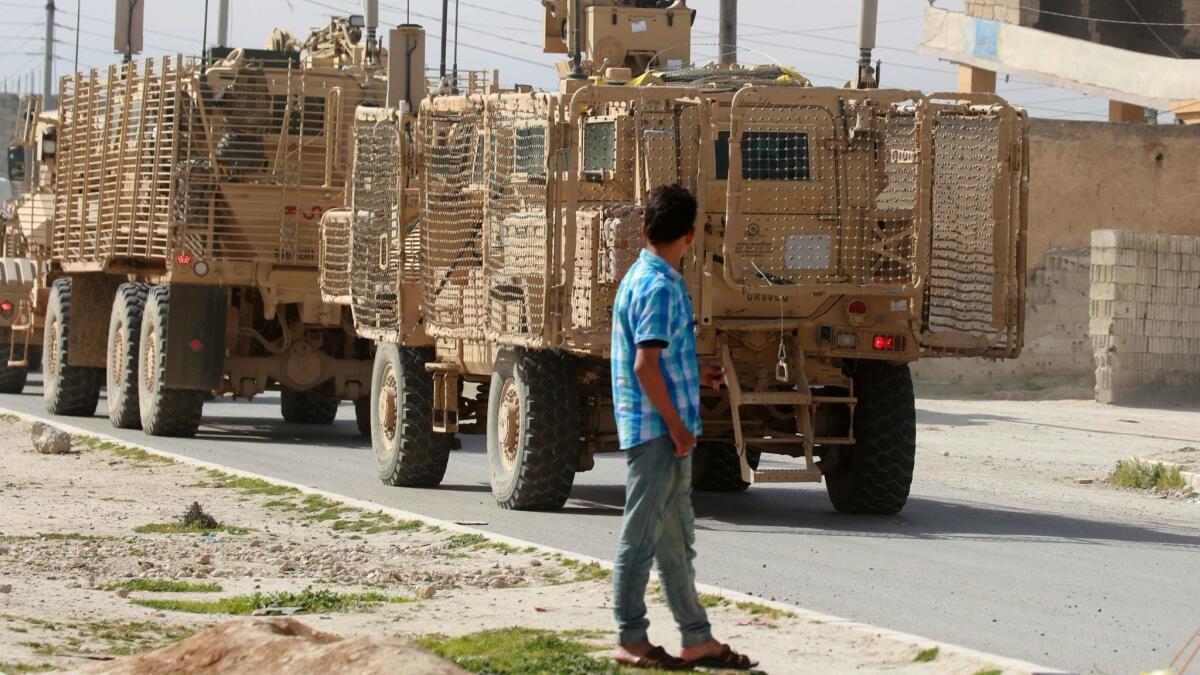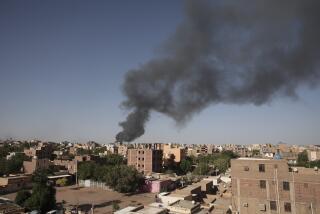Trump orders Pentagon to prepare for withdrawing U.S. troops from Syria, but some advisors push back

Reporting from Washington ‚ÄĒ President Trump has ordered the Pentagon to plan to withdraw U.S. troops from Syria, but held off setting a date after his foreign policy advisors warned that a premature pullout from the multi-sided maelstrom could repeat U.S. mistakes in Iraq and give Russia and Iran even greater sway in the region.
The decision, reached at a White House meeting Tuesday, marked a compromise between Trump, who has publicly called for a rapid withdrawal of the roughly 2,000 U.S. troops now deployed in Syria, and senior Pentagon officials, who believe that Islamic State and its allies could regenerate and pose a new terrorist threat if U.S. forces leave too quickly.
The White House reignited the debate Wednesday, however, saying that the U.S. military mission in Syria is ‚Äúcoming to a rapid end‚ÄĚ but that the administration remains committed to eliminating remaining Islamic State forces. The militants have been driven from most of the territory they once controlled in Iraq and Syria.
Pressed to explain, White House Press Secretary Sarah Huckabee Sanders said Trump wants ‚Äúto focus on transitioning to local enforcement,‚ÄĚ but he ‚Äúis not going to [declare] an arbitrary timeline‚ÄĚ on when U.S. troops will be withdrawn. The Pentagon will determine when conditions have improved enough to permit a drawdown, she said.
The policy tumult emerged as Turkey, a nominal U.S. ally and member of the North Atlantic Treaty Organization, hosted a summit in Ankara with Russian President Vladimir Putin and Iranian President Hassan Rouhani to discuss the conflict in Syria. All three countries have troops fighting there.
In a joint statement after the meeting, the three countries lined up behind Syrian President Bashar Assad‚Äôs government in Damascus, which the U.S. opposes, saying they supported ‚Äúthe sovereignty and territorial integrity of Syria as well as the national security of the neighboring countries.‚ÄĚ
And in an apparent allusion to the eastern Syrian enclave controlled by the U.S. military and predominately Kurdish allies, the three leaders rejected efforts to create ‚Äúnew realities on the ground under the pretext of combating terrorism.‚ÄĚ
In a sign of the war’s complex alliances, Turkey’s president, Recep Tayyip Erdogan, recently threatened to attack U.S. forces who are supporting Syrian Kurdish guerrillas fighting Islamic State. Turkey considers the guerrillas to be allies of a Turkish terrorist group.
Trump, who has frequently insisted that he would not ‚Äútelegraph‚ÄĚ his military plans in advance, may find it difficult to convince Defense Secretary James N. Mattis and top military commanders to set a deadline for pulling out U.S. troops.
In 2008, President George W. Bush signed a status of forces agreement that called for all U.S. forces to withdraw from Iraq by the end of 2011. President Obama met that deadline ‚ÄĒ despite warnings from the Pentagon and critics that Iraq was still unstable ‚ÄĒ only to send them back in 2014 after Islamic State fighters swept into the country from Syria and appeared on the verge of capturing Baghdad.
With Iraq largely back in government hands by the end of 2016, Trump sent additional U.S. troops into Syria after he took office. But in recent briefings, he has repeatedly complained about not having a clear path to pull out of Syria once Islamic State ‚ÄĒ now mostly confined to several small pockets ‚ÄĒ is brought to heel.
That frustration came to a head this week after Trump received briefings about Islamic State losing nearly all of its Syrian territory and learned that Erdogan was hosting Russian and Iranian leaders to coordinate their actions in Syria, according to a person familiar with the discussions.
Trump‚Äôs public statements Tuesday about pulling out of Syria took his top military advisors by surprise ‚ÄĒ a pattern for Trump, who often floats decisions in public or on Twitter to goad officials into action.
‚ÄúI want to get out. I want to bring our troops back home. I want to start rebuilding our nation. We will have, as of three months ago, $7 trillion in the Middle East over the last 17 years. We get nothing ‚ÄĒ nothing out of it, nothing,‚ÄĚ he said during a news conference with three visiting Baltic state leaders. ‚ÄúSo it‚Äôs time. It‚Äôs time.‚ÄĚ
A Brown University study estimates the actual costs of U.S. wars since 2001 is about $3.6 trillion, or about half what Trump says.

In a White House meeting later Tuesday with Mattis, outgoing national security advisor H.R. McMaster and other top aides, Trump ordered his national security team to craft plans to pull out of Syria and to push Gulf Arab allies ‚ÄĒ including Saudi Arabia ‚ÄĒ to take over responsibility for rebuilding and providing security in the country‚Äôs east, perhaps by sending their own troops.
Senior national security officials have repeatedly warned that a precipitous U.S. withdrawal would open the door for Iran and Russia to expand influence in the region and leave longtime Kurdish allies more vulnerable to a brutal Turkish crackdown. It also would raise security concerns for Israel, which has called for stronger action to counter Iran’s presence and influence in Syria.
Some Trump advisors insisted he is attuned to those concerns.
‚ÄúHe‚Äôs not going to pull out until he has a solution that won‚Äôt cede the field to Russia and Iran,‚ÄĚ said Jim Hanson, the president of the Security Studies Group, a conservative think tank with close ties to the White House. It is drafting a plan for regional allies to assume peacekeeping and rebuilding duties in Syria.
The White House is ‚Äúsearching for a solution that will enable the U.S. to get out well,‚ÄĚ Hanson said.
One idea being floated is to convince the Gulf Cooperation Council for the Arab States of the Gulf, a regional intergovernmental group, to send peacekeeping troops to Syria and pay the U.S. at least some of the costs of providing air cover and other logistical support. Saudi Arabia, the largest of the group, already is bogged down fighting Iranian-backed rebels in Yemen.
Trump spoke by phone Monday night with Saudi Arabia’s King Salman, and last month hosted Crown Prince Mohammed bin Salman at the White House. It’s unclear if he convinced them to take a significantly larger role in Syria.
But Trump long has railed against U.S. nation-building efforts. Last week, the State Department froze a $200-million fund created to help stabilize Syria, reportedly after Trump learned about the fund in news accounts. The decision to freeze the money could be reversed, officials said.
The gulf between Trump and some of his advisors was clear Tuesday when Gen. Joseph Votel, the top U.S. commander in the Middle East, said in Washington that U.S. troops are required to defeat the last Islamic State strongholds in Syria and to help stabilize liberated areas.
‚ÄúThe hard part I think is in front of us,‚ÄĚ Votel said at the U.S. Institute of Peace, a government-funded think tank. ‚ÄúAnd that is stabilizing these areas, consolidating our gains, getting people back into their homes, addressing the long-term issues of reconstruction and other things that will have to be done. And of course, there is a military role in this.‚ÄĚ
Moments later, Brett McGurk, the special presidential envoy for the coalition to counter Islamic State, told the same group that U.S. military and diplomatic assets had successfully prevented clashes between Turkey and Syrian Kurdish forces, which would have expanded the war.
‚ÄúIt‚Äôs incredibly complex,‚ÄĚ McGurk said, ‚Äúbut we have to work through this diplomatically with our NATO allies and reassure our partners on the ground.‚ÄĚ
McGurk also insisted that the U.S. will remain in Syria to fight Islamic State. ‚ÄúThat is our mission, and the mission isn‚Äôt over, and we‚Äôre going to complete that mission,‚ÄĚ he said.
The Syrian civil war erupted in 2011 and has left an estimated 400,000 people dead, according to United Nations estimates. In recent years, it has become a free-for-all of outside states trying to divide the spoils and expand influence in the Middle East.
A U.S. withdrawal would leave the U.S. with even less leverage ‚ÄĒ another argument some of Trump‚Äôs advisors make for staying.
The small U.S. military contingent in northeastern Syria, mostly special operations troops and contractors, have been training local forces, removing hidden bombs, and trying to restore basic services in areas recaptured from the militants.
The danger was driven home last week when a U.S. special operations soldier and a British commando were killed during a mission to kill or capture an Islamic State leader. Their vehicle was destroyed by a bomb.
White House officials said Trump will not be driven by arbitrary timelines to remove U.S. troops from Syria, arguing that doing so would only encourage Islamic State to resist.
But the decision to announce an expected pullout may produce the same result, making a withdrawal that much harder and persuading allies to contribute troops and funds even more difficult, experts said.
Special correspondent Umar Farooq contributed from Istanbul, Turkey.
Twitter: @davidcloudLAT
Twitter: @ByBrianBennett
For more on international affairs, follow @TracyKWilkinson on Twitter
More to Read
Sign up for Essential California
The most important California stories and recommendations in your inbox every morning.
You may occasionally receive promotional content from the Los Angeles Times.













